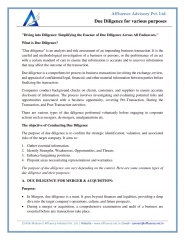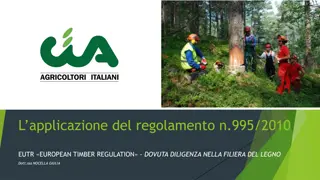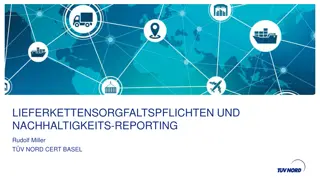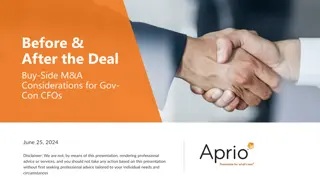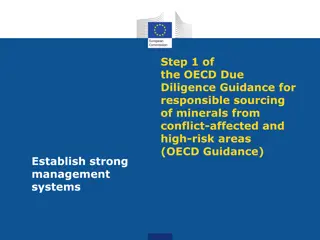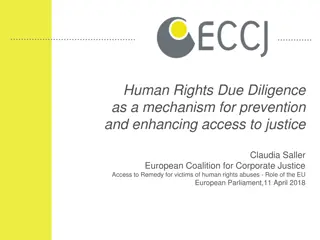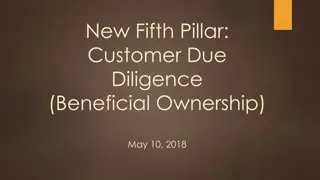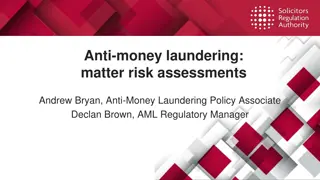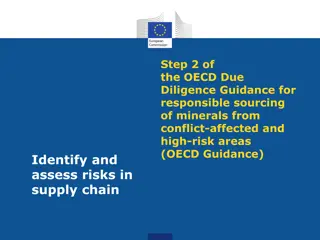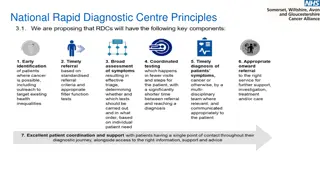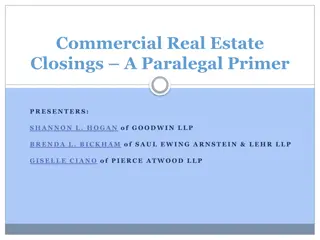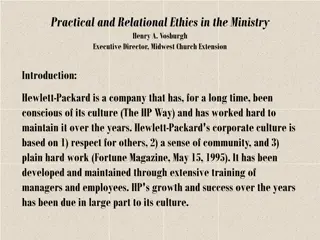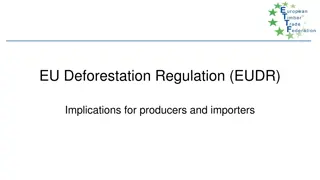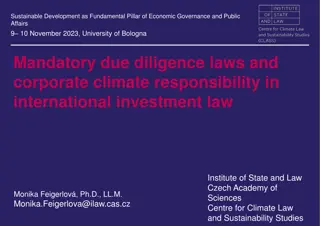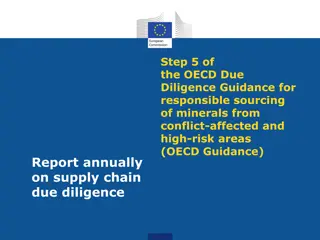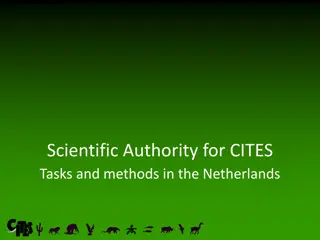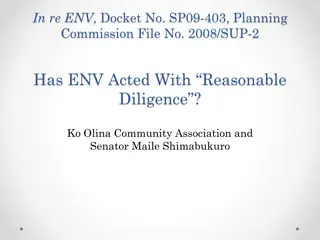
Understanding M&A Due Diligence
Gain insights into M&A due diligence, a crucial investigation into the legal, financial, and regulatory aspects of a business. Learn about its importance, objectives, and legal defense aspects for informed decision-making in mergers and acquisitions.
Download Presentation

Please find below an Image/Link to download the presentation.
The content on the website is provided AS IS for your information and personal use only. It may not be sold, licensed, or shared on other websites without obtaining consent from the author. If you encounter any issues during the download, it is possible that the publisher has removed the file from their server.
You are allowed to download the files provided on this website for personal or commercial use, subject to the condition that they are used lawfully. All files are the property of their respective owners.
The content on the website is provided AS IS for your information and personal use only. It may not be sold, licensed, or shared on other websites without obtaining consent from the author.
E N D
Presentation Transcript
M&A Due Diligence Overview 1
Due Diligence What is it? It is an investigation into the business and underlying legal, factual, financial, and regulatory affairs of a business. 2
Due Diligence But it is also While our purpose may be to identify problems or risks, a Buyer will be looking at diligence to identify potential benefits or synergies. Can they integrate the newly acquired business? What is the inherent value of the business? Each participant on the Team will be looking at the diligence through the prism of his or her own experience. 3
Due Diligence A Defense Due Diligence is also a legal defense to a variety of private actions under the Securities Act and the Securities Exchange Act. The issuer does not have this defense the issuer is held to the highest of standards strict liability (omniscience is presumed). Underwriters and their counsel have a due diligence defense under Section 11. There is no statutory counterpart to Section 11 in the acquisition context. 4
Due Diligence A Defense (continued) In order to establish a good due diligence defense, you have to be able to show that you have conducted a reasonable investigation into the affairs of the company which enables the underwriter to assert that based on that investigation, that you reasonable believed, and in fact did believe, that there were no material misstatements or omissions in the offering document. What constitutes reasonable investigation the standard is that required of a prudent man in the management of his own property. 5
Due Diligence ... A Defense (continued) For securities offerings, this is assessed in the general context of materiality standard if a reasonable person was about to purchase securities, would this fact be important? The defense is viewed in hindsight whether you did enough diligence is often up to the court to decide and the review will be made with the benefit of hindsight. WorldCom shows you cannot ignore red flags! 6
Due Diligence 3 Objectives Full Disclosure: Gain an understanding (complete picture) of the business for an issuer/target/borrower. Make sure that the company and its business are accurately and adequately disclosed (or to verify information) in offering documents (or understood by your client). Transaction Evaluation: Understand the business and meaningfully understand and assess the risks associated with the issuer/target/borrower. Identify issues that present structural or substantive problems for deal execution. Address risk allocation (price/indemnification). Limitation of Professional Liability. 7
Factors Affecting Diligence The Party with the superior knowledge will be in the best position to: Negotiate the shifting of risks and achieve the negotiation advantage Quantify the probability of a particular risk Determine risks that they might be willing to assume Accept some risk, concede others Shift the most costly risks to the other party 8
Factors Affecting Diligence (continued) Most bad information usually comes to light absent fraud. Disclosure is a matter of timing. As a result, Sellers (with the superior information advantage) want to maintain that advantage yet by doing so it may adversely affect credibility or negotiating position with a Buyer. The Seller s superior knowledge will inevitably diminish throughout the process. A good strategy is to put in your own diligence team before the transaction starts so as a Seller you can respond to the diligence requested and control the procedures and processes. 9
Factors Affecting Diligence (continued) The usual result is a price reduction or an expanded indemnity. The timing of such disclosures can be very important. Buyers react badly to late disclosures and the consequences can be great. 10
Factors Affecting Diligence (continued) Often disclosure is staggered to prevent disclosure of sensitive information. You may see a high or general level of disclosure for solicitations (or expressions) of interests followed by more detailed disclosures after bidders or buyers are narrowed. Sellers will be even more reluctant to disclose information to counter-parties who may be competitors (and will stage those disclosures as well) to guard against unwanted disclosures. 11
Due Diligence - The Exercise Purpose, scope, and focus of the exercise varies depending on the type of transaction, the role of our client in the transaction and our role (vis-a-vis that of our client, other counsel, accountants or other professionals). There is no single comprehensive list. You cannot go to our DM database and search due diligence and obtain some perfect list for your deal. The Request List is the backbone of the investigation. It is an evolutionary process. It very much depends on the facts and circumstances of the company and the transaction. Who is preparing the list? A poorly thought-out checklist can really irritate the other side! 12
Running the Diligence Who is running the Data Room? Small deals the lawyers Larger deals the bankers Virtual Data Rooms How do they work? How are they updated? Can you confirm delivery of information to the parties? What is the transaction? What is the timing? If it s a disclosure transaction, what is required to be disclosed? 13
Running the Diligence (continued) What are the rules/agreements as to diligence? Some may involve Data Room Agreements or Rules of Engagement. Hours of availability may be limited. Copying rules. Sign-in procedures. Procedures for requesting additional documents not contained in the Data Room. 14
Due Diligence Main Categories Background Information Business Due Diligence Financial and Accounting Due Diligence and Regulatory Due Diligence Corporate Governance Due Diligence 15
Background Information Who is the company? What is the type of company? What is the size? What comes up when you google the entity? A broad internet search may provide you information with some good general information. Look for press releases Recent litigation/other issues. 16
Background Information (continued) Check the entity s website. Are they a reporting company? Is publicly filed financial information available (SEC Reports/Rating Agency Information)? Is it highly competitive industry? Understand what will be needed from this diligence Are you preparing disclosures for an offering? Are you negotiating agreements? Prioritize what needs to be reviewed. 17
Business Due Diligence I use the term Business Diligence I mean a broad overview of the Company. Note that generally most of the diligence on the business that is done will involve matters which are far outside the scope of our expertise. Our review should be limited to due diligence. Learn the business. What do they do? How do they do it? 18
Business Due Diligence (continued) Due diligence sessions with senior (key) management are very informative. Where has the company been? Prior acquisitions? Prior borrowings? Where is the company going? Future acquisitions? Plans for proceeds? What risks does the company face in connection with its business? What issues keep them up at night ? Understand what the executives responsibilities are. 19
Business Due Diligence (continued) Who makes what decisions? Are background checks necessary? Typically done in IPOs (Investment Bankers may do these especially with key-man type situations). Site tours Customer/Vendor/Supplier interviews 20
Business Due Diligence (continued) What is the threshold for determining who you interview? Talk to Third Parties who are providing a significant part of the Company s business. Potential Partners/Joint Venture Partners 21
Financial Due Diligence Many lawyers think that they can just rely on the accountants to perform this function. What you learn in conducting financial diligence will help craft the disclosure that may be needed (or a written agreement that might be necessary). Historical Financial Statements & Notes. The Notes are an important part and often times refer to agreements or facts that are critical and affect the business and its financial performance. 22
Financial Diligence (continued) Understand trends Is the business seasonal? What items have affected performance (including non-recurring items)? Did an event make the company look better (or worse) than it might ordinarily look? Understand capital expenditures. Understand liquidity needs. 23
Financial Diligence (continued) What are the assumptions used in developing models and forecasts? Are these assumptions reasonable? If you don t understand something ASK! 24
Accounting Due Diligence The level of accountants involvement may vary from deal to deal. Usually involves interviews with the entity s Audit Committee (if one exists) and its Outside Auditors. Are there any disagreements between the auditors and the company? Does the company adhere to policies used in the rest of the industry in which it operates? Are there any material weaknesses that were observed and noted in the last audit letter? 25
Accounting Due Diligence (continued) Who are the members of the Audit Committee? Do they have financial expertise? What are the internal controls? What is the review process with management for financial issues? In some cases, this involves the formal comfort letter process. 26
Legal & Regulatory Due Diligence Impacted areas: Litigation, Environmental, Employment, Intellectual Property, Tax/ERISA (Benefits), FCPA, Insurance A little help from your friends . This work will be the basis for review and modification of representations and warranties and the preparation of Disclosure Schedules. Analysis of legal liabilities and contingencies. 27
Legal & Regulatory Due Diligence (continued) Agreements/Credit Facilities Is the transaction permitted? Change of control? Assignable? Are covenants violated? Is there correspondence between the lender and the borrower? Acquisition/Divestiture Agreements/Joint Venture Docs Status of indemnification rights Understand who the counter-parties are Remaining obligations/existing covenants Customer Orders/Vendor Lists Is there a single/or few important customers? Do they give warranties on products? What are the relationships between the customers and the seller? How is business conducted? Agreements or Purchase Orders? 28
Legal & Regulatory Due Diligence (continued) ial Leases/Fee Property Purchases/Contracts Understand major provisions (i.e. term, rent, options) Understand rights at termination Lease assignments and remaining obligations Covenants or defaults Environmental obligations Related Party Transactions (non-market terms) Insurance Policies Determine how these should be reviewed (expert review is usually required) Litigation Nature of any lawsuits (again, expert assistance) Contingent liabilities 29
Corporate Governance Do you have the current copy of everything? Charter Are there restrictions on certain types of actions? Do they have enough authorized shares? Bylaws Do you have current copy? Spot check for mechanical items. Do they have the right officers appointed? 30
Corporate Governance (continued) Minutes Great way to learn about the entity. Were actions taken in accordance with governing documents? Are material actions reflected here? Are transactions mentioned that are not in the Data Room? Does any curative work need to occur? In an IPO situation, based on this review, is the Company ready for prime-time ? 31
Special Considerations - Offerings In connection with offering statements to the extent that an issuer is making either qualitative or quantitative statements backup diligence is important. After all, you need a reasonable basis for making these statements. For example: We have the largest credit card deck in the United States. We have 20% of the market share for car care products in Europe. Our customers include ABC Corp. and DEF, Inc. Do they? What is the backup for statement #1? The SEC may ask so best to know! Depending on the context naming ABC & DEF may require those parties consent. 32
Special Considerations Offerings (continued) Bottom line, what is the support for a statement? All statements must be supportable. Google can be your friend (i.e. government reported statistics). After all, plaintiff s attorneys will look to see what was available publicly on a certain topic! 33
The Diligence Report Know before you start what your team wants. Communication about the diligence results may trickle up to the deal team and decisions on issues made before the process is complete. Depending on the client s needs a summary may be prepared or a full data report will be provided. There is no one process, outcome, or work product of standardized practice that is followed. 34
The Diligence Bring-Down Continue to pay attention over several months some transactions are protracted. It continues until the DAY OF CLOSING. Everybody has a story about something happening right before Closing! Since transactions have a life of their own do NOT forget to do a bring-down of your diligence one or more times as the transaction evolves. 35
The Diligence Bring-Down (continued) These times may become more important and more obvious for deals that start and stop abruptly or deals that change structure along the way. In securities offerings, the logical times are immediately prior to pricing and immediately prior to Closing. In M&A deals or lending deals, immediately prior to Closing or Funding. This is the last chance to uncover something. It s not over until it s over! 36
Other Considerations Conducting due diligence can be a great way to improve your own drafting skills. Pay careful attention to the wording of contracts. Is the language clear enough? What would have made the clause clearer? If the contract had just said ... remember these instances when you find yourself drafting a similar document or agreement. 37
Other Considerations (continued) It s a great way to learn how a company documents its life (material contacts, regulatory, compliance, corporate governance, etc.). Know the governing law. If a contract is silent as to assignment, is it generally assignable under the applicable law? 38
Diligence to Closing Checklist Again, make a checklist. Review the transaction agreements to understand what is to be delivered at Closing. They change keep reviewing them. Review the diligence to determine if any fundamental items need to happen immediately prior, at or after Closing add these to your Closing Checklist to keep track of these items and ensure that they are done timely. Always include a Status box or some mechanism to show that actions have been completed. 39
Diligence to Closing Checklist (continued) Always include a Responsible Person notation so that everyone on the Team understands his or her duties for Closing. Convert the Closing Checklist to Closing Files. Plan ahead. A well drafted Closing Checklist can be immediately converted to the Table of Contents for a bound volume. A well drafted Closing Checklist can also help clients who request Post-Closing Obligation Summaries. 40
Post-Closing Diligence Yes it does exist. In an acquisition context, Buyers will want to make sure that they have received the benefit of their bargain. Typically, this happens in connection with indemnification periods (prior to the end of the claims period) or in connection with working capital adjustments or post-closing covenants. 41

